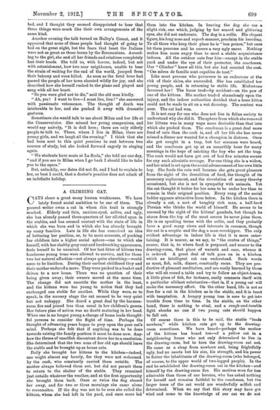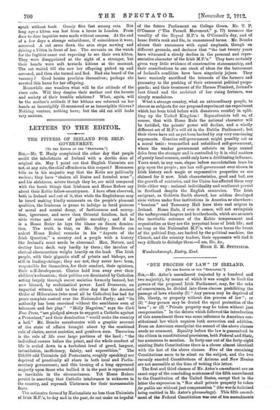A CLIMBING CAT.
CATS share a great many human weaknesses. We have lately found social ambition to be one of them. The present writer owns a cat in whom this trait is strongly marked. Elderly and thin, anxious-eyed, active, and ugly, she has already passed three-quarters of her allotted span in the stables, and has seemed content with the state of life in which she was born and in which she has already broaght up many families. Late in life she has conceived an idea of bettering her position, or, to be more accurate, of pushing her children into a. higher social sphere—one to which she herself, with her shabby grey coat and hardworking appearance, feels herself to be unsuited. Of her last litter of kittens two handsome young toms were allowed to survive, and for these two her natural affection—not always quite absorbing—would seem to be limitless. During their earliest childhood they and their mother endured a move. They were packed in a basket and driven to a new home. There was no question of their being given away; their owners moved at the same time. The change did not unsettle the mother in the least, and the kittens were too young to notice that they had exchanged one stable for another. While they were, so to speak, in the nursery stage the cat seemed to be very quiet but not unhappy. She dozed a great deal by the harness- room fire and joined less than usual in her children's games. Her future plan of action was no doubt maturing in her head. When one is no longer young a change of home leads thought- ful persons to consider the flight of time. Perhaps the thought of advancing years began to prey upon the poor cat's mind. Perhaps she felt that if anything was to be done towards raising the family position it must be done now. Any- how the throes of unselfish discontent drove her to a resolution. She determined that the two sons of her old age should leave the stable and be broaght up as house cats.
Daily she brought her kittens to the kitchen—indeed, one might almost say hourly, for they were not welcomed by the cook, who constantly carried them outside. The mother always followed them out, but did not permit them to return to the shelter of the stable. They remained just outside whatever the weather, and at the first opportunity she brought them back. Once or twice the dog chased her away, and for two or three mornings she came alone to reconnoitre. If the dog was not to be seen she called the kittens, whom she had left in the yard, and once more led
them into the kitchen. In braving the dog she ran a slight risk, one which, judging by her scared and glittering eyes, she did not underrate. The dog is a collie. His elegant
figure, his long nose and superb manner, proclaim his breeding. To all those who keep their place he is " bon prince," but once
let them presume and he sneers a very ugly sneer. Nothing makes him more angry than to meet a stable acquaintance indoors. All the outdoor cats fear him—except in the stable yard and under the eye of their protector, the coachman. Our " Climber " knew all this, but she had counted the cost. " Cee mires de famille sont capables de tout."
Like most persons who persevere in an endeavour at the risk of their skins, she succeeded. She has established her young people, and is returning to stable life. Misfortune favoured her ! The horse trod—by accident—on the paw of one of the kittens. His mother traded shamelessly upon the injury, and the indoor authorities decided that a lame kitten could not be made to sit on a wet doorstep. The contest was over. The cat had won.
It is not easy for one who does not live in feline society to understand why she did it. The sphere from which she removed
her kittens was in many ways more desirable than that into which she pushed them. The coachman is a great deal more fond of cats than the cook is, and all her life she has never missed a dinner nor wanted for a champion in distress. Once she got caught in a trap, but her screams were heard, and the coachman got up at an unearthly hour for many mornings in the hope of catching the boy who set the trap.
The cook would not have got out of bed five minutes sooner for any such altruistic revenge. For one thing she is a widow, and her mind is set upon the social advancement of her own little boy. She feeds the cats well because she gets great pleasure from the sight of the demolition of food, the thought of its necessary replacement, and the circulation of money thereby occasioned, but she is not in sympathy with animals. Yet the cat thought it better for her sons to be under her than to remain in their original position. Every rung of the social ladder appears attractive from below, In the kitchen there is already a cat, a sort of haughty rich man, a half-bred Persian who thinks the world of himself. He seems to be amused by the sight of the kittens' gambols, but though he stares from the top of the meat screen he never joins them.
He is on speaking terms with the collie, and they probably have a good many views and interests in common, though the cat is a sceptic and the dog a man-worshipper. The only evident advantage in indoor life is that it is more enter- taining. It is nearer, as we say, to "the centre of things," nearer, that is, to where food is prepared, and nearer to the drawing-room, that place of warmth and ease, whence it is ordered. A great deal of talk goes on in a kitchen which an intelligent cat can understand. Such words as meat, fish, milk, dinner, constantly recur. They are pro- ductive of pleasant meditation, and are easily learned by those who will sit round a table and try to follow an object-lesson.
A little piece of fish, for instance, easily connects itself with a particular sibilant substantive—that is, if a young cat will make the necessary effort. On the other hand, life is not so free for a cat in the kitchen as in the stable, and it is beset with temptation. A hungry young torn is sure to get into trouble from time to time. In the stable, on the other hand, there is nothing to steal, and a rough-and-tumble fight shocks no one if two young cats should happen to fall out.
Of course there is this to be said, the stable "leads nowhere," while kitchen cats get up to the drawing; room sometimes. We have heard—perhaps the mother of the kittens has heard too—of a yellow cat in a neighbouring house who not only determined to live in the drawing-room, but to turn the drawing-room eat out.
He came as a stray from nowhere and, being frightfully ugly, had no assets but his size, his strength, and his power to flatter the inhabitants of the drawing-room (who belonged,
of course, to the upper world of two-legged people). In the end he established the drawing-room cat in the kitchen—and
himself by the drawing-room fire. His motives were far less admirable than those of our heroine, who has asked nothing for herself and remains faithful to the coachman, but the larger toms of the cat world are wonderfully selfish and determined. When we say that this story may hare got wind and come to the knowledge of our cat we do not speak without book. Gossip flies fast among cats. Not long ago a kitten was lost from a house in London. From door to door inquiries were made without success. At the end of a few days a strange coincidence, if coincidence it were, occurred. A eat came down the area steps mewing and driving a kitten in front of her. The servants on the watch for the fugitive came out expecting to see their own kitten. They were disappointed at the sight of a stranger, but their hearts were soft towards kittens at the moment. The cat waited till she saw her offspring picked up and caressed, and then she turned and fled. Had she heard of the vacancy P Good homes proclaim themselves; perhaps she coveted this home for her offspring.
Meanwhile one wonders what will be the attitude of the risen cats. Will they despise their mother and the haunts and society of their humble relations P What, again, will be the mother's attitude if her kittens are returned on her bands as incorrigibly ill-mannered or as incorrigible thieves P Nothing venture, nothing have; but the old cat still looks very anxious.



























































 Previous page
Previous page